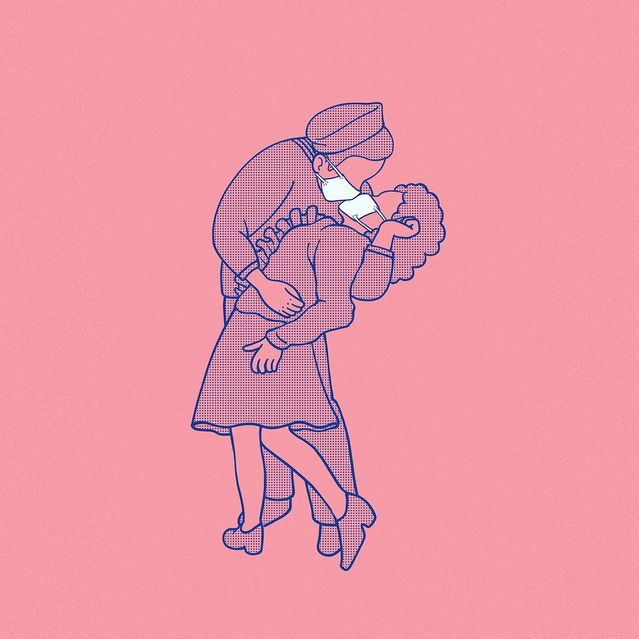Relationships
Differentiation Is the Crucial Relationship Skill You Need
Learn how to be autonomous while maintaining intimacy.
Posted April 7, 2020 Reviewed by Hara Estroff Marano

Being quarantined with my wife and kids for three weeks has tested my personal and relational skills. In this past month, we’ve gone through anxiety attacks, conflicts, highs, lows, home dance parties, misunderstandings, ruptures, and repairs.
In times like these, I happily rely on the theories, skills, and techniques I’ve learned and developed as a couples therapist. Yet, of all the skills I learned, there is one that stands out: differentiation.
This concept has changed my marriage, my practice, and the way I try to be in relationships in my life. My ability to differentiate has been crucial in the past weeks for my personal sanity and functioning, as well as for maintaining a (mostly) open, playful, and intimate relationship with my wife. I hope it will serve you well, too.
What is differentiation?
Differentiation refers to the process of cells naturally becoming more distinct and specialized as they evolve. As we evolve, we differentiate not only physically, but also emotionally and psychologically from our family of origin.
There are two forces that pull us in a different direction in every relationship:
- Attachment/togetherness. The pull to be loved and belong. In this polarity, we might choose to minimize our personal preferences or dull our traits in order to be loved by our partner.
- Autonomy/individuality. The pull to be myself. This is who I am. Take it or leave it.
When someone is poorly differentiated, they usually find themselves in one of those forces. It is an either/or reality: Either be myself or be close to the other.
Differentiation is the ability to balance the autonomy and the attachment so it is not an either/or. The more differentiated you become, the closer these two forces become. Essentially, it is the ability to be connected to your thoughts, values, and feelings, while also being close to someone, especially when that person is very important to you. Alternatively, it could be defined as being close without being reactive. I like to define differentiation as simply being “big and together”.
We internalize our level of differentiation from our parents and family of origin. Children usually recreate their parents' levels of differentiation or lower, since that is what they know. Sometimes, one of the children, due to life circumstances, therapy, or their partner, will be able to raise their differentiation to a higher level than that of their parents.
Relationships are crucibles
Crucible is David Schnarch’s metaphor for any intimate, committed relationship. A relationship is a hot and visceral place where you constantly rise, flourish, fail, “die,” and can be reborn. You keep reinventing yourself and developing. Relationships are, in fact, a challenge scene full of conflict, gridlocks, anger, pain, lust, love, desire, growth, and creativity. The only way to really grow is to step inside crucibles and face the unavoidable conflicts in them.
Differentiation and choosing a partner
We usually have one polarity that we gravitate toward (autonomy or attachment). Alternatively, some people swing between the two. And we tend to choose partners (friends, colleagues, and workplaces) with a similar level of differentiation and the same level of ability to sustain intimacy.
The combination of differentiation preferences will affect the dynamic of the relationship:
- Two partners who default to attachment polarity will end up in a symbiotic relationship.
- Two partners who default to autonomy polarity will create a volatile relationship where both partners are vowing for the lead.
- The most common dynamic is where one partner leans to autonomy and the other to attachment. Sometimes this dynamic is rigid and fixed. Often, though, the partners switch the polarities and take turns taking the lead.
What are the characteristics of a poorly differentiated relationship?
- Complete avoidance of conflict (symbiosis) where both partners are deep in the togetherness polarity.
- Constant fighting (symbiotic-hostile dynamic) where both partners are stuck in the autonomy polarity, because they are unable to find a way to bridge their differences.
- Cutoffs. When family members avoid talking to each other for months, years, or even decades. Or children who emigrate as a desperate attempt to reclaim autonomy, because they feel unable to do so while in the relationship.
- High reactivity. Poorly differentiated couples experience emotional fusion, in which one partner’s feelings spill over and trigger their partner. This creates a dynamic where each partner feels responsible for their partner’s feelings. Over time, this makes intimacy a flooding experience; as a result, partners avoid sharing their emotions by either growing apart or by constantly fighting (which keeps them both at arms distance and feeling anger instead of pain).
Sense of self, revisited.
There are essentially two ways we can experience our self.
Reflected sense of self
A reflected sense of self is how we all start experiencing ourselves. Our self can be seen as a relational self, in which our perception of ourselves is dependent on the feedback we get from our parents, family of origin, and society. As children, we are dependent on our caretakers’ feedback to know ourselves. The height of the sense of self is in adolescent, where peer pressure is at its peak.
When you operate from a reflected sense of self, then you’re constantly on the lookout for positive feedback and for people who love you. You also avoid people who are critical of you. When operating from a reflected sense of self, you become careful with revealing too much of yourself, because a partner’s feedback can deeply affect your confidence, energy, and zest.
Solid sense of self
Yet there is a more developed sense of self, which is a solid sense of self. That is the sense that you know who you are, what you’re worth, and your truth, regardless of external feedback you receive.
This sense of self requires use of the prefrontal cortex to remind us of who we are and what we believe in, despite criticism and conflict.
In relational psychotherapy, self is seen as composed from many different self-states. It’s been my experience that while some self-states are reflected, other self-states are solid. It is our life’s mission to develop more and more solid self-states.
Intimacy
In this paradigm, we distinguish between other-validated intimacy, where I’m dependent on my partner for intimacy, and self-validated intimacy, where I choose proactively to share my truth. I wrote extensively about the art of intimacy here.
Why increase differentiation?
You always have the choice to raise your level of differentiation. But why should you? Raising your level of differentiation can help improve your life in different ways.
- Personal relational freedom. You will feel freer and more authentic in your relationships. You will also develop the ability to live through different self-states in your life, which is the essence of play.
- Enriching your intimate relationship. Raising differentiation will help your relationship be more open and accepting of all your different self-states. You will be able to enjoy a relationship where you can “come as you are,” and even your shadow parts are welcome.
- Aiding your children’s psychological and emotional health. Since you model your level of differentiation for your children, by raising your own differentiation you give them a more evolved starting point from which to begin their relational journeys in life.
- Improving your social and professional relational settings. Since you attract others who are at your same level of differentiation, by raising your differentiation you begin to attract more mature, regulated, and authentic people and groups. Additionally, you can only help others raise their level of differentiation to your own level of differentiation. So by raising differentiation, you can better serve your colleagues, clients, and friends.
How to raise your level of differentiation?
Differentiation is raised not in solitude or by reflection but within intimate relationships. So here are the four points of balance that can help you achieve differentiation:
- Maintain a flexible, solid sense of self. Know thyself. Be connected to who you are, know your strengths and weaknesses. Own your sh*t: Stop suppressing, denying or dissociating parts of yourself that you don't like. Be familiar and comfortable with your different self-states (both positive and negative).
- Remain grounded when responding. Your ability to stay grounded and calm, even when your partner is triggered, anxious, or emotionally flooded will support you in staying in the relationship without exploding, stonewalling, or enacting the holy trinity of blocking. By raising differentiating you can "Let It Land", to really hear and internalize your partner’s criticism, frustration, loneliness, despair, and more, without becoming flooded or reactive. In time, this will enable both of you to be more open.
- Keep a quiet mind and calm heart. Your ability to self-soothe and regulate yourself is important. You can achieve this through mindfulness, meditation, or therapy. Verbalizing your feelings often has a regulating effect.
- Engage in meaningful endurance. Choose to believe that committed, long-term relationships are people-growing mechanisms. Choose to understand that in order to be alive and authentic with another person is a visceral crucible, full of unavoidable ruptures and repairs. Trust that all those fights, misunderstandings, aggression, despair, love, admiration, highs, and lows are all part of the journey toward greater differentiation.
"The only way around is through”
For me, raising differentiation is a life goal, a beacon guiding me to be more myself while being closer to others in this world. I can attest that my ability to differentiate has helped me navigate my marriage successfully during this crisis and I believe differentiation can help you develop toward personal and relational freedom, even when you are quarantined at home.
I wish you this personal and relational freedom as well.
References
Bowen, M. (1993). Family therapy in clinical practice. Jason Aronson.
Bromberg, P. M. (1996). Standing in the spaces: The multiplicity of self and the psychoanalytic relationship. Contemporary psychoanalysis, 32(4), 509-535.
Gergen, K. J. (1999). An invitation to social construction. London, England: Sage.
Schnarch, D. M. (1991). Constructing the sexual crucible: An integration of sexual and marital therapy. New York, NY: WW Norton & Company.
Schnarsh, D. (1997). Passionate marriage: Keeping love and intimacy alive in committed relationship. New York, NY: Owl books.




